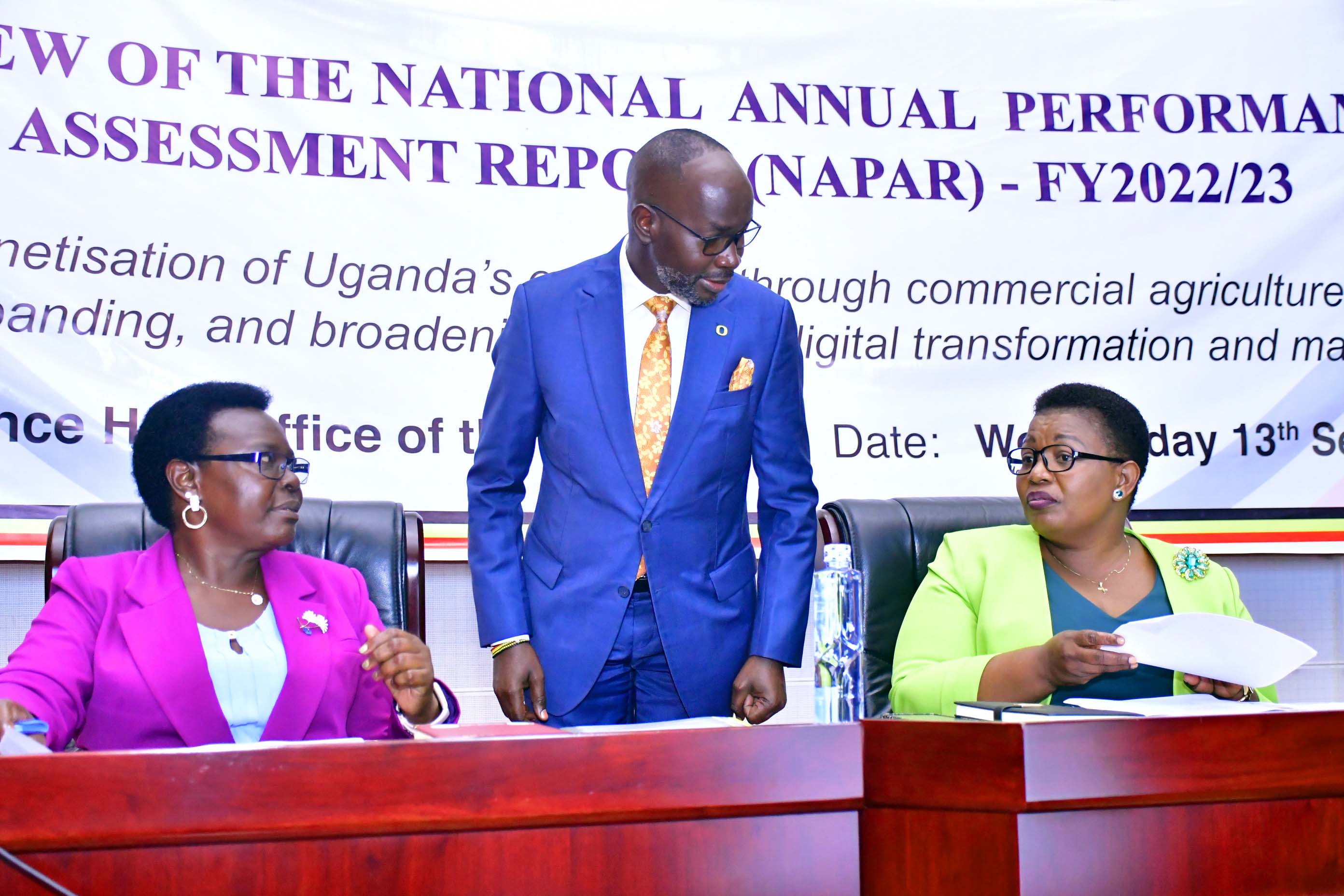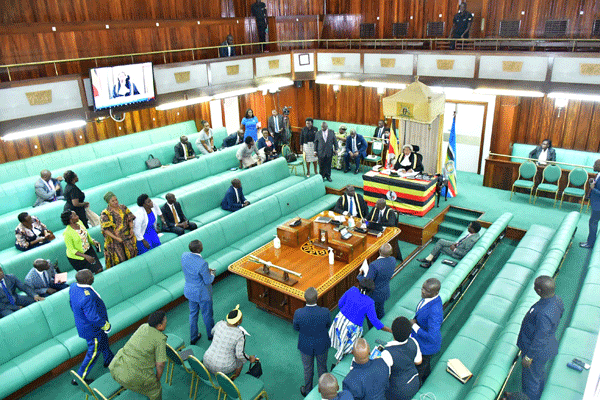Prime
Why officials have turned the heat on Finance ministry

Left-Right: State Minister for Northern Uganda Grace Kwiyucwiny, Government Chief Whip Denis Hamson Obua and Minister for General Duties in OPM Kasule Lumumba at the release of the National Annual Performance Review for 2022/23 in Kampala on September 13, 2023. PHOTO/ DAVID LUBOWA
What you need to know:
- Officials accuse Finance ministry of frustrating their efforts to recruit, train and retain workers in central and local government.
Ministries of Public Service, Local Government, Education and Sports have blamed counterparts in the Ministry of Finance for staff shortages, low pay, and lack of funds to carry out needed supervision and inspection within their dockets.
The affected ministries accuse Finance ministry officials of withholding money for recruitment, filling vacant positions, and general human capital development needed to carry out government programmes and projects.
The ministries have reported huge staffing gaps across the board, poor facilitation and low pay for existing staff and poor facilitation.
The Auditor General’s report for 2022 indicates that 66 government ministries, departments, and agencies had staffing gap levels of between 30 percent and 55 percent, with 8,353 approved positions remaining vacant. These figures do not include districts, cities, and lower local governments across the country.
The government in FY2022/2023 enhanced salaries for the scientists, leaving other professionals in the cold. This generated a round of industrial actions, but President Museveni remained resolute, saying the government would not be blackmailed into yielding to salary demands when priority areas remain underfunded.
During the release of the national annual performance assessment report for FY 2022/2023 this week, a number of stakeholders raised the need for the government to speed up the formulation of a national pay policy, which they said will set standards for uniform salary enhancement across the board.
However, Mr Muruli Mukasa, the minister of Public Service, said the problem is far from the pay policy. Mr Mukasa said the biggest problem is that the finance ministry is obsessed with infrastructure and other sectors, which they set as priority areas while neglecting human resources and capital.
“You need to think further about the finances. The main constraint is not about the lack of policy, but the lack of funds to rollout the pay policy. Even in 2017, the Cabinet agreed on pay principles which everyone is aware of but there has been no funds to roll it out,” he said.
The Public Service minister also said officials from the Finance ministry have always locked themselves in the ministry to set out priorities for the country without consulting other ministries. He has recommended that human capital development must be elevated to a priority level and funds allocated for recruitment and salary enhancement across the board.
“Every vote, every budget indicates the gaps and even local governments work out the amount of money they require and then at the end of the day the Finance ministry says no, this money is not available. That is why I am saying manpower recruitment, filling of vacant positions must be taken as a priority including salary enhancement,” Mr Muruli said.
While the budget for salaries and wages for FY2023/2024 stands at Shs7.3 trillion, the government put a ban on recruitment in all its ministries, departments, and agencies. The affected ministries want the ban lifted.
“Where priorities are decided, sometimes Public Service ministry is not there and Local Government ministry is not there. The officials at the highest level of the Finance ministry sit somewhere in their office and decide the priorities of the country. Now I am talking and they are hearing when they meet this time, let pay enhancement, vacancy filing, and capacity building be one of the priorities and then you see if that happens and Public Service ministry delays recruitment and if the Local Government doesn’t recruit then we shall be the ones to blame,” Ms Muruli said.
Mr Ben Kumumanya, the permanent secretary of Ministry of Local Government, said their biggest challenge in trying to perform their duties and ensure that the right staffing is in place to execute their mandates and those of districts, cities, and lower local government has been because of officials at the Finance ministry.
“Finance ministry officials never listen to us whenever we ask for the wage that we need nor have they listened to us whenever we bring our recruitment plans. The hope now is in the payroll audit but I want to be on the record that once the payroll audit is out, local governments must be listened to,” he said.
He said currently, 62 districts have no district planners, and more than 100 districts do not have education health and chief finance officers, which he said is affecting the planning and execution of budgets.
“So I want clear answers that after the payroll audit, funds for critical staff in local governments including heads of department who are vote holders and heads of divisions, that money must be found,” Mr Kumumanya said.
He also accused the Finance ministry of removing funds for inspection and supervision in local governments without consulting them.
Mr Kumumanya also said the Central Government has been recruiting staff from the local government, leaving such entities to look for new staff whose capacities need refresher training, and yet the funds were lumped as consumptive and removed from the national budget.
“My proposal is that the Finance ministry should support entities to inspect and supervise local governments and be able to admit feedback from such inspections on what is happening…and If you check people recruited to the centre [Central Government], the biggest percentage comes from the local governments and every time we are replacing. Now when there is not capacity building because there are no funds, you cannot expect to have good performance,” he said.
The Education ministry is equally affected by the funding gaps, which, Ms Ketty Lamaro, its permanent secretary, said need to be filled.
Ms Lamaro said the ministry has prioritised recruitment of teachers in the next financial year and yet there is no guarantee that funds will be availed for the exercise. She said the ministry has just completed a validation exercise across the country whose results await blessings from the Finance minister and permanent secretary, and secretary to the treasury, Mr Ramadhan Ggoobi.
She added that the issue of inspecting schools has also hit the ministry hard because of the lack of funds.
“We also note that inspections are very key components of our mark as education but we do not have funds for inspection. I am supposed to inspect each school per term, but as it stands right now, I can only inspect one school per term and go back to that school after three years with the current resources I have. So you can see the challenges we have,” Ms Lamaro said.
Recruitments
During a meeting between the parliamentary Committee of Local Government and Public Service last month, district and city leaders accused the Finance ministry of sending money to entities that did not request funding and denied entities that submitted requisitions for the funds. Arua, Gulu and a few other districts and cities pointed out the anomalies and wondered what the intentions were.
Ms Victoria Rusoke Busingye, the minister of State for Local Government, also said districts that have issues are denied funds, and those that do not need such funds are given money, which is immediately swept back to the treasury.
“During that meeting, we got the complaints and how do you send money to someone who does not need it and yet the one who needs it is not given? There must be something wrong,” she said during a meeting held at the Office of the Prime Minister (OPM) last Wednesday.
Ms Justine Lumumba Kasule, the minister of General Duties in the OPM, chaired the Wednesday meeting.
“We have also received complaints from local governments that said they have recruitment plans and figures but they are not given money, while those that do not have plans are given money. We have also seen the bulk of funds returned to the treasury are for salaries so we don’t know what is happening,” she said.
However, the Finance ministry was quick to deny the anomaly.
Mr Lawrence Semakula, the accountant general, said the ministry only sends money on request. He, however, said, once the ongoing payroll audit is complete, such problems will be sorted out completely.
“The wage estimates that we have are based on recruitment plans that are submitted by the accounting officers so the ministry of Finance cannot, therefore, send more money than they had requested for. As you know, the ministry has instituted a special audit on the payroll which will inform us on the issues to do with the payroll. Once that is done, we shall at cabinet level be able to address issues that have been discussed here,” Mr Semakula said, in response to questions raised at the meeting.
Mr Amos Lugoloobi, the State minister of Finance, Planning and Economic Development, said there are issues with funding, which all ministries are aware of and that once the issues are addressed, things will improve.
“The question [the] honourable minister of Public Service is asking, he also has answers for them. He knows what is happening and we have held discussions with him about the same. However, when things get better, we shall sort out these problems,” he said last Wednesday.



